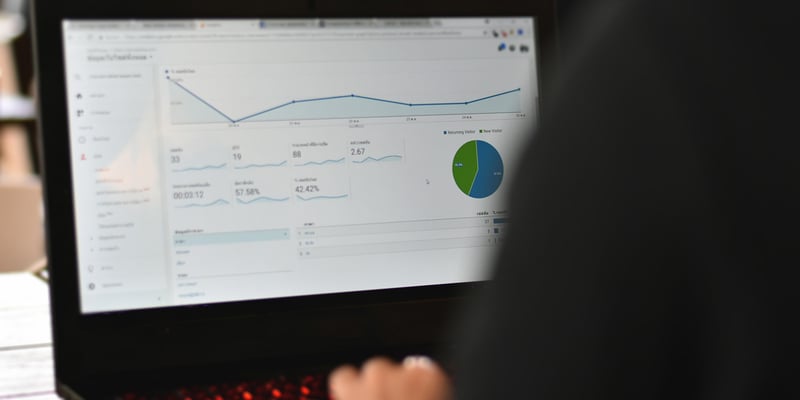
How to survive the death of the online cookie.
In a statement from February last year, Google announced that marketers will have to get their hand out of the cookie jar - for good. Starting from 2022, Google plans to phase out third-party cookie support on Chrome browsers. With a global desktop internet browser market share of about 69%, this is a big deal. In this blog post, we’ll cover how you can survive the coming cooking apocalypse.
What is Google doing?
Google is following the trends of other browsers like Firefox and Safari by phasing out third-party cookies. These cookies play a critical role for marketers to track website visitors, improve their user experience and collect data to create personalised, targeted adverts. They also enable us to learn what website visitors are checking out online when they aren’t on our websites.
Google announced the intended change in February 2020, but has since made a more recent announcement that they won't be building "alternate identifiers to track individuals as they browse across the web, nor will we use them in our products." Google cites their belief that cookies, as we know them today, will fail to meet the rising consumer expectations for privacy as well as the rapidly evolving regulatory restrictions. In other words, cookies are not a sustainable long-term investment.
How will it affect you?
When Google eventually phases out support for third-party cookies, marketers will no longer have the insights they once enjoyed. As a marketer, you will no longer be able to see the websites your visitors go to after visiting yours.
Some of the ways you will notice the change is that you will no longer have knowledge of your web visitor’s overall online behaviors like:
- Websites they frequently visit.
- Purchases on other websites.
- Interests show on various websites.
To get a good idea of how third-party cookies work, consider visiting an online store and adding shoes to your wishlist. Later that day, you visit a news website but see the shoes you added to your wishlist in a pop-up advert. Chances are, this pop-up advert was triggered by a third-party cookie.
Many marketers feel that they will lack the ability to track the right data, with a substantial amount predicting a need to increase their spending by 5% to 25% to achieve the same results as 2021. In addition, experts have noted that many companies will begin to invest in email marketing software when Google’s new policy drops.
If you’re a marketer or advertiser who relies on third-party data to pinpoint online audience targeting strategies, the change may sound quite intimidating. However, there are a few important considerations that are not all doom and gloom.
What you can do about the change
1 - Google’s own cookies aren’t going anywhere - use them!
While Google is banning third-party cookies, first-party cookies will still be fair game. First-party cookies are often used for user experience by remembering passwords, basic visitor data, and other preferences.
With the first-party cookie, you can learn about the actions your user takes while on your website, how often they visit and other basic analytics.
You'll usually be able to see basic analytics like:
- The number of web sessions on a page.
- The number of pages people click on during a visit.
- Basic browser types.
- Geographical demographics.
- Referring websites where visitors clicked a link to your site's URL.
This means that you can still use this information to create personalised profiles of your visitors if you build out your website intelligently and use best-practice marketing automation techniques.
2 - Alternatives are being developed
Third-party cookies track individuals, but the tracking of groups of people is still possible even after the change.
Along with Google's Privacy Sandbox development, the company has already seen successful advertising results from FloC, a technology that tracks groups of people rather than individuals.
"Our latest tests of FLoC show one way to effectively take third-party cookies out of the advertising equation and instead hide individuals within large crowds of people with common interests," Google's recent announcement explained.
Such alternatives will help marketers with different sources of insights and information filling the void left behind by third-party cookies. Additionally, newer solutions will undoubtedly be presented after the change.
3 - Adapt to the opportunity
Marketers should always strive for innovative new approaches to stay relevant. As privacy laws continue to arise, this might be a great opportunity to look at other less-vulnerable advertising alternatives just in case another governance renders one of your marketing tactics or processes obsolete.
Take Google’s move as an opportunity to brainstorm better alternatives and ads that identify with your audience without having to rely on hyper-targeted content or annoying pop-ups. You and your business will be better off for it.
4 - Stay in the know
Google’s policy has not yet been implemented - so currently there’s nothing to worry about. However, this does not mean you need to stay in the dark. We suggest staying up-to-date with news related to third-party cookies and other data privacy moves that could impact your business.
If your advertising approach relies upon third-party data and cookies, it’s time to start considering alternatives. As the news related to the phase-out continues to stream in, so should you start to vet any solutions that could help you transition away from your current approach.
Get ready - for success
How you react to external changes in your marketing approach will determine your marketing effectiveness now and into the future. Staying in the know and using best marketing practices are the best defense against changing market conditions and regulations. As a digital marketing agency with over a decade of digital marketing experience, Demodia can help you prepare for internal and external digital marketing challenges.
If you would like some guidance or assistance with the new Google changes to third-party cookies or just an experienced consultant to help you create memorable online marketing campaigns, contact us today. Our expert marketers are ready and waiting to help you achieve your marketing goals.


